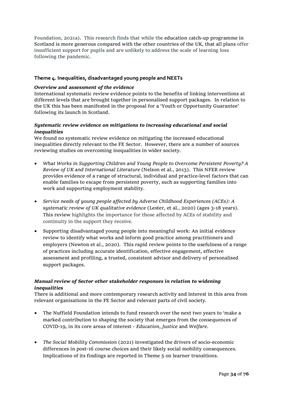
Page 34 of 76
Foundation, 2021a). This research finds that while the education catch-up programme in
Scotland is more generous compared with the other countries of the UK, that all plans offer
insufficient support for pupils and are unlikely to address the scale of learning loss
following the pandemic.
Theme 4. Inequalities, disadvantaged young people and NEETs
Overview and assessment of the evidence
International systematic review evidence points to the benefits of linking interventions at
different levels that are brought together in personalised support packages. In relation to
the UK this has been manifested in the proposal for a 'Youth or Opportunity Guarantee'
following its launch in Scotland.
Systematic review evidence on mitigations to increasing educational and social
inequalities
We found no systematic review evidence on mitigating the increased educational
inequalities directly relevant to the FE Sector. However, there are a number of sources
reviewing studies on overcoming inequalities in wider society.
• What Works in Supporting Children and Young People to Overcome Persistent Poverty? A
Review of UK and International Literature (Nelson et al., 2013). This NFER review
provides evidence of a range of structural, individual and practice-level factors that can
enable families to escape from persistent poverty, such as supporting families into
work and supporting employment stability.
• Service needs of young people affected by Adverse Childhood Experiences (ACEs): A
systematic review of UK qualitative evidence (Lester, et al., 2020) (ages 3-18 years).
This review highlights the importance for those affected by ACEs of stability and
continuity in the support they receive.
• Supporting disadvantaged young people into meaningful work: An initial evidence
review to identify what works and inform good practice among practitioners and
employers (Newton et al., 2020). This rapid review points to the usefulness of a range
of practices including accurate identification, effective engagement, effective
assessment and profiling, a trusted, consistent advisor and delivery of personalised
support packages.
Manual review of Sector other stakeholder responses in relation to widening
inequalities
There is additional and more contemporary research activity and interest in this area from
relevant organisations in the FE Sector and relevant parts of civil society.
• The Nuffield Foundation intends to fund research over the next two years to 'make a
marked contribution to shaping the society that emerges from the consequences of
COVID-19, in its core areas of interest - Education, Justice and Welfare.
• The Social Mobility Commission (2021) investigated the drivers of socio-economic
differences in post-16 course choices and their likely social mobility consequences.
Implications of its findings are reported in Theme 5 on learner transitions.